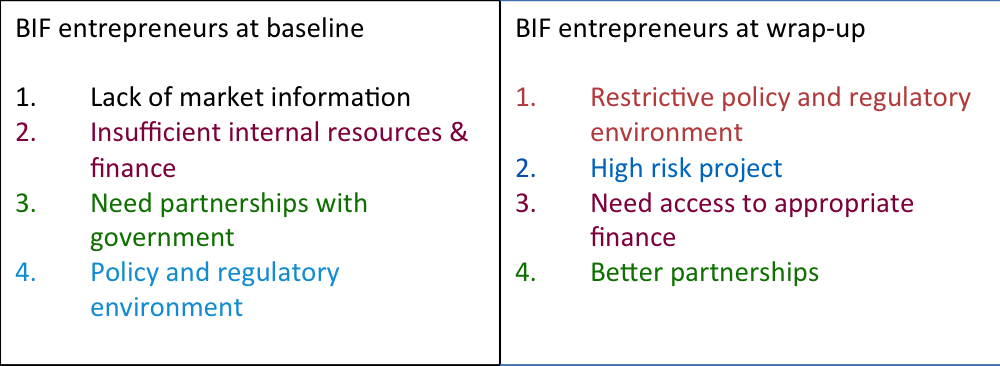The most common challenges faced by inclusive businesses
Over the last four years, over 150 companies have answered a similar set of questions about the challenges they face in implementing their inclusive business. The companies range from concept stage start-ups within the Innovations Against Poverty Portfolio to MNCs pursuing a business model at the base of the pyramid in the Business Call to Action portfolio. But despite the variation in size, sector and maturity, some common themes appear.
The challenge most often selected (from a long list) relates to finance - grant finance for early stage companies, 'appropriate' finance for others, and internal finance for the large company initiatives. In all four respondent groups outlined below, finance appears in the top four.
The second broad area of challenge is partnerships - the need for 'better partnerships' or 'effective partnerships with government' recur three times in the top four challenges identified.
The other two challenges that recur are the regulatory environment and high risk of the inclusive business project.
The first set of responses to consider is from start-ups that received grant finance from Innovations Against Poverty. During their completion report or progress report in 2013, 29 companies identified their top three challenges. The most common four are shown below, with access to further grant support just piping commercial finance, reflecting the early stage of these innovations.
In the Business Innovation Facility, initiates tended to be at pilot or roll-out stage. Responses from 36 companies given both at baseline (2010, 2011 or 2012) and at Progress Update stage (2013) show how their challenges evolved as they mature.

When they first applied for technical support from the Business Innovation facility, lack of market information was the top challenge. As they piloted and matured, lack of market information fell away as a challenge, while regulation and risk moved right up, followed by finance and partnerships. In the finance challenge, many BIF entrepreneurs emphasised the 'appropriate' word - finance is out there, but not necessarily suited to their needs. Similarly with partnerships, it not more partnerships but 'better' partnerships they called for, as they matured.
Finally we come to 49 respondents who are BCtA members, typically somewhat more mature (half past break-even), more than half are emerging companies rather than long-established. Their internal and external challenges are explored further in Joe Shamash's new blog, but the top ones relate to the business model, their consumers, and resources.
Given their relative maturity, it's interesting that even for this group 'developing a business model that is commercially viable' is the most common challenge. This certainly emerged as the big picture challenge from BIF and IAP, and indeed is the topic of the 'Four Ps of Inclusive Business' which draws lessons from BIF. As a drop down choice, this was not offered to the BIF and IAP respondents, though they instead flagged 'high risk' as a challenge. I rather think that if this wording had been on offer, this would emerge as the top challenge across all four data sets.